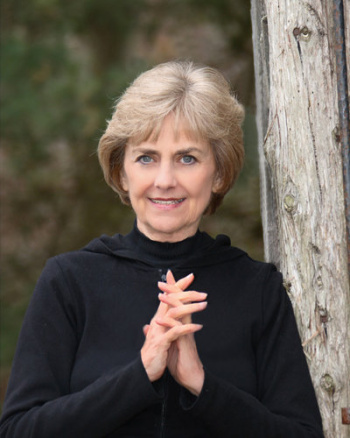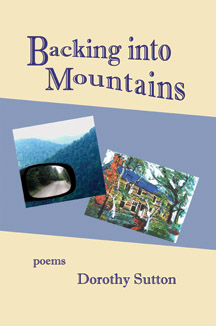Katerina Stoykova-Klemer’s interview with poet Dorothy Sutton

Dorothy Sutton is the author of Backing into Mountains (Wind Publications). Dorothy Sutton’s work has appeared in Poetry; The Hudson Review; Antioch Review; Prairie Schooner; Virginia Quarterly Review, Poetry Daily web site and others. Her chapbook of poems, Startling Art: Darwin & Matisse, won the Finishing Line Press Award in 1999, and was nominated for a Pushcart Prize. Sutton received the Tyrone Guthrie Award in 1995, chosen by both Arts Councils of Ireland and the Virginia Center For the Creative Arts for a residency at Annaghmakerrig in County Monaghan. Other awards include the Robert Frost Scholarship in Poetry at Bread Loaf Writing Conference, a Grolier Prize, a residency at Atlantic Center for the Arts, and a 1999 Individual Artist Grant from the Kentucky Arts Council.
You’re the author of Backing into Mountains. Can you tell the readers of Public Republic about this book?
The poems are mostly set in Kentucky, but they had been published earlier in such diverse locales as England, Ireland, Wales and Australia — it made me feel good to hear the critics declare them universal. One said, “These poems are poignant and humorous, taking us on a most expansive philosophical adventure. Hang on! You’ll end up romping all over the world, including a frolic with Einstein in the fields of time and space!”
Dublin poet Eileen Casey praised the way the title poem paid tribute to “the tenacity of the bus drivers of Appalachia, a cultural region in the Eastern United States, forced to breathtakingly negotiate very difficult terrain. In the same way, Dorothy Sutton takes each poem (and us) from one imaginative location to another, by the sheer force of her deep and intimate knowledge of what it is to be human.”
Tell us about the publisher, Wind Publications.
Wind Publications (Nicholasville, Kentucky) publishes a most impressive list of beautifully crafted, award-winning books. Your readers can read about my new book (and others) there http://windpub.com/books/backing.htm. Editor Charlie Hughes operates on a “shoestring” budget (often from his own pocket) in order to search out and publish excellence in writing (his only criteria). I know your readers love to support these small, independent publishers as much as I do.
What are these poems about? What are the themes and topics in Backing into Mountains?
Topics are the “minute particulars” of Kentucky, but the themes include a cosmos of people, thoughts, and feelings. Some examples are:
● Science and nature (“Prometheus Among the Leaves” a poetic summation of the formation of coal in Kentucky, “Relatively Speaking” with Galileo, Einstein, Darwin)
● A variety of women’s points of view – especially my own (“When Your Mother Dies,” “She Made Only Things That Did Not Last,” “Dark Cured,” “And I Say Yes”)
● Being tough and hanging on through difficulty (“The Problem With Old Chickens Is the Gristle,” “Moving Pictures,” “Backing Into Mountains”)
● Effects back home from World War I, World War II, the Korean War — endless wars it seems! (“No Man’s Land,” “The Rest of the Resume,” “Crying Uncle”)

You wrote a poem about the human body, “What We Learn in Medical School.” This poem took on a life of its own. Can you please tell the readers of Public Republic this story?
First, an international health/medical web site published the poem. Then, a medical school professor at the University of Manitoba, Winnipeg, emailed me to ask permission to make copies for use in her cadaver classes! (I’m telling you this poetry business is interesting!) She loved the poem’s reverence and respect for the human body, virtues she wants her students to develop for the bodies they work with. She also wanted permission to read it each year for the friends and relatives of the donors, in the year-end memorial ceremony celebrating that beautiful and generous donation. Of course, I was delighted!
What is your relationship with Charles Darwin?
Charlie is my darling – to paraphrase an old folk song! I fell in love with Darwin when I read Desmond and Moore’s biography several years ago. He was such an earnest young man, starting out to be a minister. I, too, had planned to go into church work in my youth. I identified with his perplexity in realizing, on his Galapagos voyage, the incredible age of the earth, and how species had time to evolve – and later, his anguish at the implications of his discovery. I went through that exact process 100 years later. How brave and honest he was to acknowledge his findings to the world. He gave me the courage to recognize my convictions – I truly adore him!
How many poems have you written about Darwin and his theories?
Fifteen Darwin poems appeared in my first book, Startling Art: Darwin and Matisse. They start with his mother’s death when he was eight, then move on to Edinburgh Medical School at sixteen, the voyage of the Beagle including the Concepcion earthquake, and the death of his dear ten-year-old Annie. I was honored when Richard Dawkins asked if he might read one of the sonnets upon his induction into the Royal Society in 2001 – and doubly pleased when Richard sent me his photo of Darwin’s signature dating from his own induction there 150 years before, and told me that Darwin’s great-great-grandson was in the audience. These poems will be reprinted (with new ones) in my next collection, Modern Odyssey, as soon as I find a publisher!
You spent some time in Ireland. Why did you go there?
I went first because I teach modern British and Irish literature (wrote my dissertation about the influence of William Blake on William Butler Yeats). I enjoyed Dublin, then took a train up to Sligo for the annual two-week Yeats School (I highly recommend) including a bus-ride to Yeats’s Thoor Ballylee near Galway. Our elderly guide remembered seeing Maude Gonne around the streets of Dublin. I enjoyed talking with W.B. Yeats’s daughter, Anne Butler Yeats (yes, the one for whom he wrote “A Prayer For My Daughter,”), especially regarding her relationship with her father. I felt right at home with her – she was just like my Mom!
I returned to Ireland many times because the people are so darned wonderful, and because Kentucky and Ireland have so very much in common. An Irish critic wrote that this recent book of mine was “a joy to read, in terms of capturing the cadences of lives lived and voices heard in the Kentucky of [Sutton’s] childhood, different and yet the same as mine in Ireland. An emotional bridge is formed between Kentucky and the rest of the world.”
You got to be with Seamus Heaney and Eavan Boland in Ireland?
I got to be with Seamus at every Yeats School (in one, he led the poetry workshop). I felt totally at ease with him because we have so much in common – we’re the same age and grew up on small farms, etc. He’s very down to earth, a real sweetheart. As we talked one night, I asked about his feelings of growing up Catholic in Protestant Northern Ireland. “No labels,” he said. “Labels separate people.” We’ve corresponded off and on ever since. I sent a note when he won the Nobel Prize, and he wrote back – as busy as he was!
I liked Eavan too – she’s close in age, and certainly in temperament, making us compatible. We worked together at a Dublin workshop given by Eastern Washington U. Seamus and Eavan are such fine poets – two of my favorites.
You were awarded the Foundation Distinguished Professorship and an Excellence in Teaching Award (nominated by students and alumni), your university’s two highest honors. What is your response to these honors?
Teaching (in all of its forms, which includes writing of all kinds) is so immensely important – education our only hope. I’m the luckiest person in the world to have such a job. Naturally, I’m greatly humbled by the honor.
You’re currently Poetry Editor of Chaffin Journal, and you have been an editor there since 1985. Who should read this journal, and who can submit to it?
All readers of Public Republic would enjoy the excellent poetry and short fiction in this Award-winning magazine. Please, all of you, check us out on the internet http://www.english.eku.edu/chaffin_journal/ and then send us some good poems — I hope you win the $100 prize for best poem!
What do you read for pleasure?
Mostly poetry and science.
What do you wish for the readers of Public Republic?
“Relatively Speaking,” the last poem in my new book, celebrates the kinship of all peoples everywhere. I wish you joy, my brothers and sisters!











2 comments so far ↓
Nobody has commented yet. Be the first!
Comment